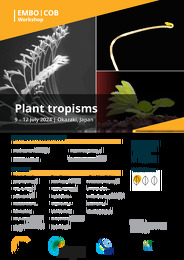About the Workshop
Since Charles Darwin’s “The Power of Movement in Plants”, it has become evident that plants use elaborate mechanisms to control their growth in response to environmental cues such as light (phototropism), gravity (gravitropism), or touch (thigmotropism). Essential for tropic growth is the differential distribution of the phytohormone auxin, which regulates differential cell elongation within tissues. With advances in the molecular understanding of tropic growth, this has become an attractive field for biophysicists.
Still much remains to be understood about how stimulus perception leads to tropic growth. In the past years, there have been many new relevant findings, which now need to be brought together to foster interactions between experimenters and disciplines: E.g. new molecular players have been identified (LAZY proteins, AGC1 kinases); new mechanisms of the respective signaling pathways have become apparent (phototropin kinase targets, phosphorylation control of cellular events); previously unknown rapid auxin responses have been observed; structural analyses of auxin transporters have uncovered the mechanisms underlying auxin transport regulation; physicists have successfully modelled tropic growth combining theory and biology.
In our EMBO workshop “Plant Tropisms”, we will bring together biologists and modelers to report on their progress and discuss new findings on tropism regulation.
This workshop will be held in a hybrid format, combining in-person meetings (preferred) with online participation. We strongly encourage researchers and students to personally come to Okazaki and to participate in the conference for face-to-face discussions.
We encourage participants to give poster presentations. There will be numerous opportunities for short talk presentations chosen from poster submissions. Online participants have an opportunity to share their poster files with all workshop participants.
This EMBO Workshop was made possible by funding provided by The Company of Biologists.
About EMBO Courses and Workshops
EMBO Courses and Workshops are selected for their excellent scientific quality and timelines, provision of good networking activities for all participants and speaker gender diversity (at least 40% of speakers must be from the underrepresented gender).
Organisers are encouraged to implement measures to make the meeting environmentally more sustainable.










